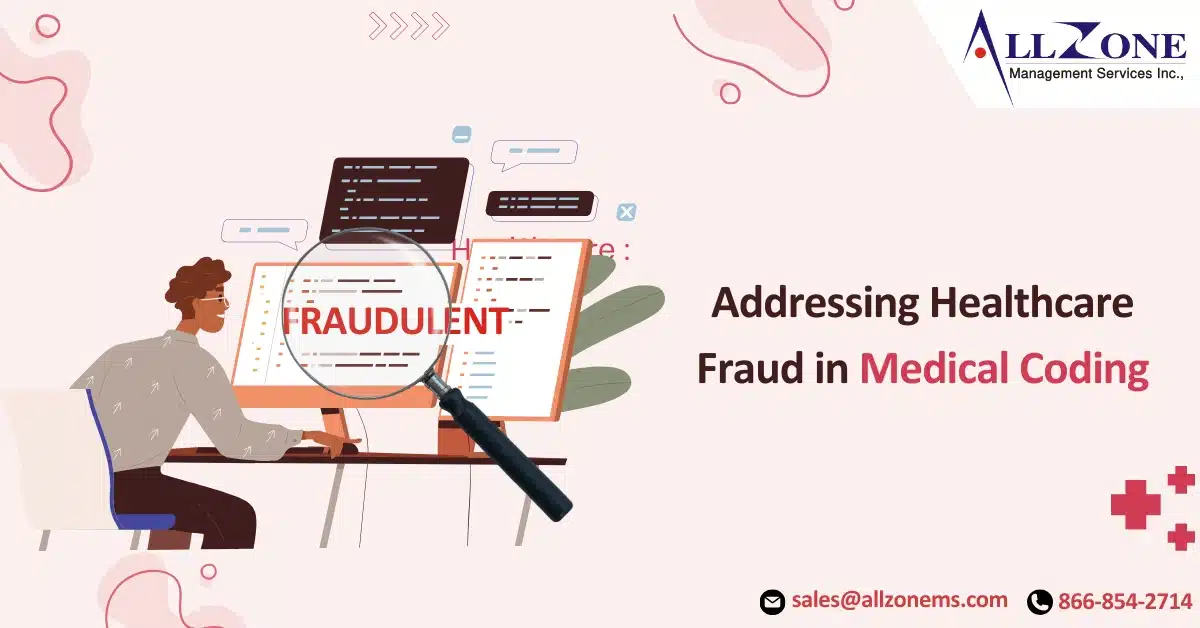Healthcare fraud in medical coding, particularly through practices like upcoding and unbundling, has become a major concern for medical coding and billing professionals. A recent healthcare market research survey found that 90% of respondents view upcoding as a significant ethical challenge
Upcoding involves assigning higher-level codes to medical services than are warranted, leading to inflated reimbursement claims. This fraudulent practice not only puts healthcare organizations at risk of penalties but also contributes to the overall increase in healthcare costs.
The survey also revealed that many coding professionals feel pressured by their employers to engage in upcoding. In some cases, they are directly ordered to do so, which could potentially make them liable for these fraudulent activities.
Furthermore, the survey highlighted concerns about risk score manipulation. This practice involves exaggerating the health risks of a patient population to qualify for higher value-based reimbursements. While a smaller proportion of respondents acknowledged this issue, it still raises significant ethical concerns.
As the threat of healthcare fraud in medical coding persists, nearly half of survey respondents expressed worries about the integrity of coding processes. With an anticipated increase in whistleblower cases related to upcoding, the industry must take proactive steps to address these issues and maintain ethical standards
The Complex Landscape of Medical Coding
While medical coding professionals are aware of the potential for fraud within their industry, they also recognize that many errors and discrepancies stem from the inherent complexity of healthcare systems. A significant majority (85%) of respondents in a recent survey agreed that the intricate nature of these systems contributes to the issues identified during coding audits, raising questions about the fairness of such reviews.
When it comes to the practice of bundling and unbundling payments, survey respondents expressed mixed opinions. While 55% believe that bundling payments can sometimes overlook the full extent of services provided, they also acknowledged the potential for fraudulent billing through unbundling, which involves separately coding individual components of a single procedure.
The Challenge of Adapting to Value-Based Care
As healthcare shifts towards value-based care models, medical coding professionals are facing new challenges. Over two-thirds of respondents (64%) expressed concerns about the adaptability of current coding best practices to these new reimbursement models. Additionally, 29% believe that aligning existing systems with the rigorous documentation requirements of value-based care will be difficult. To mitigate the risk of healthcare fraud in medical coding within this evolving landscape, providers must implement robust compliance programs and stay updated on industry regulations.
The Double-Edged Sword of SDOH Coding
While coding for social determinants of health (SDOH) is a well-intentioned practice aimed at addressing patients’ health-related social needs and securing appropriate reimbursement, medical coding and billing staff have concerns about its potential impact on patient experience.
A significant portion of survey respondents (69%) expressed worry that SDOH coding could unintentionally reinforce implicit biases or influence coverage decisions. This highlights the need to carefully consider the potential consequences of this practice and to implement measures to mitigate any negative impacts on patients.
The Looming Shadow of ICD-11
Medical coding professionals are increasingly concerned about the upcoming transition to the ICD-11 coding system. While the exact timeline remains uncertain, it’s expected to occur between 2025 and 2027.
A significant portion of survey respondents (80%) expressed worry about the need for additional training to adapt to the new system and the potential for coding errors during the initial phase of ICD-11 implementation. Furthermore, 87% of respondents are concerned about overall readiness, despite the fact that only 11% of provider organizations have begun preparations.
These concerns echo the anxiety surrounding the previous transition to ICD-10. While that transition ultimately went smoother than anticipated, it underscores the importance of ample preparation for major medical coding changes. As the healthcare industry gears up for the ICD-11 transition, proactive planning and comprehensive training will be crucial to minimize disruptions and ensure a smooth transition.
AI and Medical Coding: A Double-Edged Sword
The medical coding and billing community is expressing concerns about the increasing use of AI to automate billing processes. While AI is already being employed to automate certain coding and billing tasks, a significant majority of respondents (94%) remain uncertain about its ability to accurately capture the complexities and nuances of medical coding. To ensure the integrity of the billing process and prevent healthcare fraud in medical coding, it is crucial to carefully monitor and validate AI-generated codes.
Furthermore, 97% of respondents fear that the reliance on AI could lead to a decrease in human oversight of medical billing processes. Additionally, nearly three-quarters expressed concerns that AI may inadvertently perpetuate biases within medical coding and billing.
Medical Coding and Billing Services: Streamline Your Revenue Cycle
Medical coding and billing services are essential for healthcare professionals to ensure accurate documentation, streamlined claims processing, and prompt reimbursement. Here’s an overview of each:
Medical Coding Services
Medical coding services translate diagnoses, treatments, and procedures from patient charts into standardized codes (such as ICD-10, CPT, and HCPCS codes). This process is critical for maintaining accurate patient records and ensuring correct billing.
Benefits:
- Ensures accurate data capture for billing and reporting
- Facilitates quicker claims processing
- Reduces the likelihood of denied claims due to coding errors
Medical Billing Services
Medical billing translates coded medical records into billable claims and submits them to insurance companies for reimbursement. Billing services manage the entire revenue cycle, from patient registration to final payment posting.
Benefits:
- Maximizes reimbursement with minimal delays
- Enhances cash flow for healthcare practices
- Reduces administrative burden on providers
Why Outsource Medical Coding and Billing?
Healthcare providers often outsource these services to specialized companies that focus on compliance, accuracy, and technology-driven solutions. Outsourcing can reduce operational costs, streamline workflows, and improve reimbursement rates.
With the right medical coding and billing service provider, healthcare professionals can focus on patient care, while experts manage the complexities of the revenue cycle.

